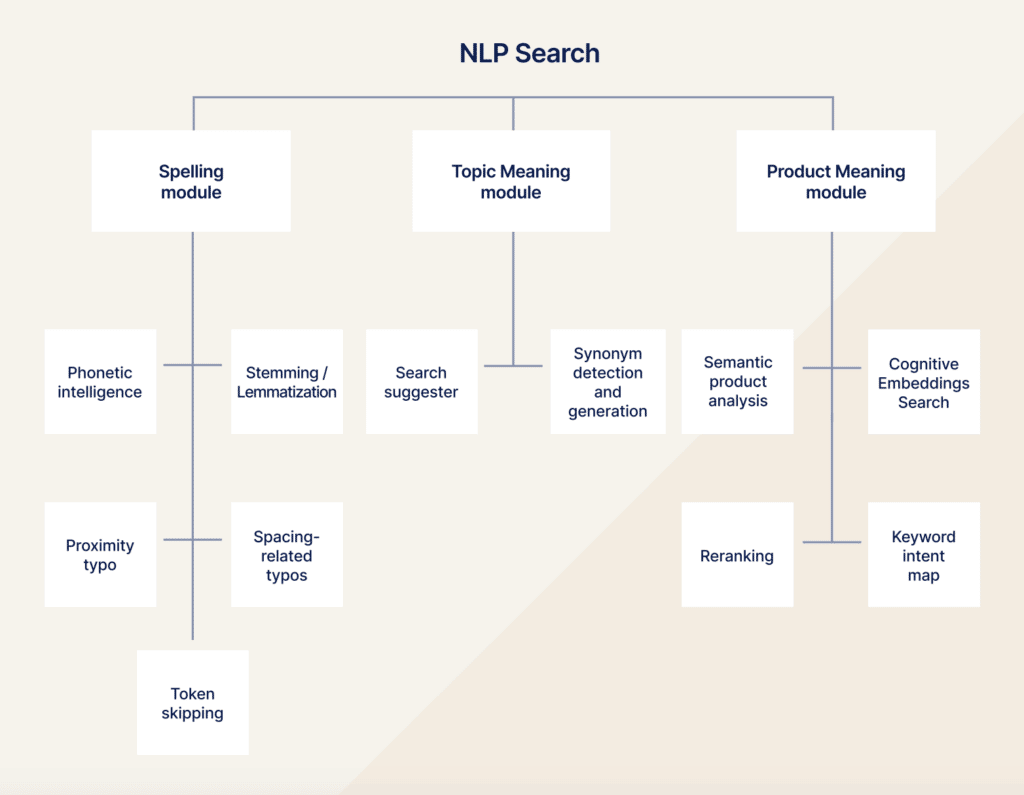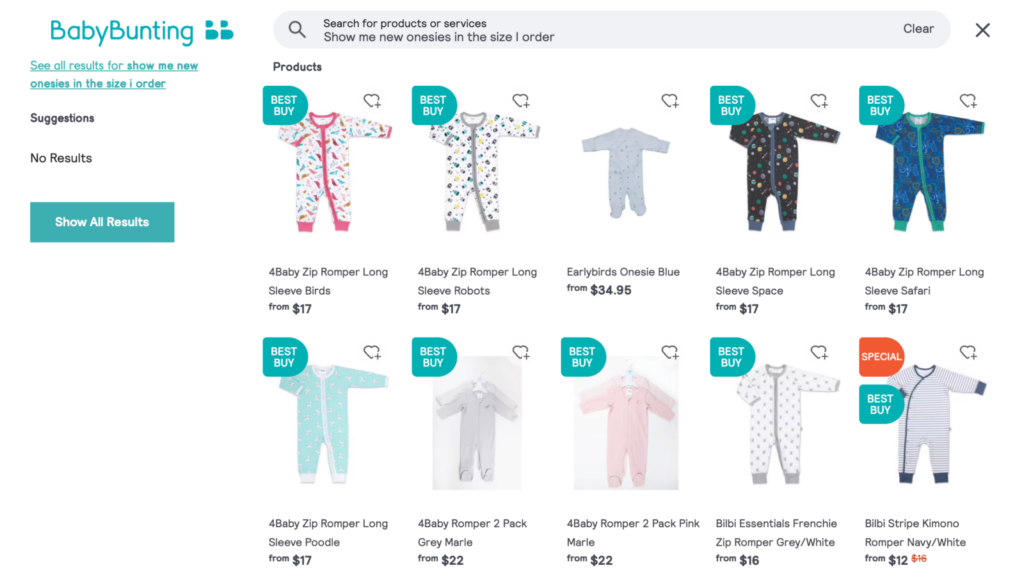Bad search experiences are costly, not only in terms of proven monetary value, but also brand loyalty and advocacy. Over 75% of U.S. online shoppers report that an unsuccessful search resulted in a lost sale for the retail website. And 85% of global online consumers view a brand differently after an unsuccessful search.
This disconnect between what a shopper wants and what retailers’ search engines are able to return costs companies billions of dollars annually.
The solution? A natural language search engine that quickly provides relevant results by understanding ways that real users use language online. The outcome: increased conversion rates and industry-leading customer experiences that drive lifetime value.
Join us as we go into detail about natural language search engines in ecommerce, including how and why to leverage natural language search and examples of ecommerce use cases in the wild.
Table of Contents
What is Natural Language Search?
How Natural Language Search Works
Benefits of Natural Language Search
- Improving the Customer Journey
- Answering Complex Questions
- Understanding Search Intent Better
- Leading to Better Conversion Rates
What is Natural Language Search?
Natural language search, also known as “conversational search” or natural language processing search, lets users perform a search in everyday language.
So instead of searching for “vitamin b complex” and then adjusting filters to show results under $40, a user can type or speak “I want vitamin b complex for under $40.” And attractive, relevant results will be returned.
Natural language search isn’t based on keywords like traditional search engines, and it picks up on intent better since users are able to use connective language to form full sentences and queries.
Think of it as a more human way to search. And that’s the direction search is heading.
How Natural Language Search Works
Natural language search is powered by natural language processing (NLP), which is a branch of artificial intelligence (AI) that interprets queries as if the user were speaking to another human being.
It works by collecting vast amounts of unstructured, informal data from complex sentences — and in the case of ecommerce, search queries — and running algorithmic models to infer meaning.
Some of the most common NLP processes include removing filler words, identifying word roots, and recognizing common versus proper nouns. More advanced algorithms can tackle typo tolerance, synonym detection, multilingual support, and other approaches that make search incredibly intuitive and fuss-free for users.

For an ecommerce use case, natural language search engines have been shown to radically improve search results and help businesses drive the KPIs that matter, especially thanks to autocorrect and synonym detection.
We dive into them and other benefits below.
Benefits of Natural Language Search
Because natural language search learns from human behavior, it provides certain benefits over traditional search engines, especially for ecommerce stores.
Improving the Customer Journey
Because users more easily find what they’re searching for — and especially since you personalize their shopping experience by returning better results — there’s a higher chance of them converting.
This experience increases quantitative metrics like revenue per visitor (RPV) and conversion rate, but it improves qualitative ones like customer sentiment and brand trust. When a customer knows they can visit your website and see something they like, it increases the chance they’ll return.
Plus, a natural language search engine can reduce shadow churn by avoiding or better directing frustrated searches.
Answering Complex Queries
By nature, NLP search engines are engineered to respond better to human language, including accurately interpreting slang, full sentences, etc. But did you also know that they pick up on contextually relevant search queries as well?
Imagine a user asks a natural language search engine “Show me new onesies in the size I order” on a retailer site for baby clothes.
Traditional site search would typically return zero results for a complex query like this. The query simply has too many words that are difficult to interpret without context.
If that retailer site collects clickstream data and has a search solution that uses NLP, they’ll be able to leverage that information to return relevant, attractive products in real-time for the user, just like Baby Bunting below.

Cognitive Embeddings Search (CES) is to thank for this. CES uses contextual awareness via a vector-based representation of your catalog to return items that are as close to intent as possible. This greatly reduces zero-results rates and the chance of customers bouncing.
Understanding Search Intent Better
In the same light, NLP search engines use algorithms to automatically interpret specific phrases for their underlying meaning.
Imagine a different user heads over to Bonobos’ website, and they search “men’s chinos on sale.” With an NLP search engine, the user is returned relevant, attractive products at a discounted price.

An NLP algorithm would also interpret synonyms, misspellings, etc. correctly.
Sadly, almost 75% of internal search engines can’t return relevant results for product synonyms, requiring users to search using the exact phrasing as the site (or site merchandisers to spend countless hours identifying and manually adding synonyms to return the correct results).
And over a third of sites don’t return useful results when users search for a model number or misspell just a single character in a product title. (We won’t go into it here, but these sorts of instances contribute to the hidden costs of broken internal site search and are the reason why 99% of product search engines fall short of expectations.)
But with natural language search, the same query misspelled — “men’s chimos en sale” — would also lead to attractive, relevant products being returned, as such:

Leading to Better Conversion Rates
At the end of the day, the combined benefits equate to a higher likelihood of site visitors and end users contributing to the metrics that matter most to your ecommerce business.
Machine learning simplifies the extremely complex task of layering business KPIs on top of personalized search results. With an NLP search engine, you’re able to not only rank products based on first-party clickstream or zero-party customer data, but also according to the KPI you’re targeting—average order value (AOV), inventory management, profit margin, etc.
This means your team has more time to hone their ecommerce strategy while the algorithm does the brunt of the merchandising work needed to satisfy and convert user queries.
This exact technology is how large retailers and ecommerce stores like home24 have seen double digit growth in search conversion across multiple regions and languages.
Natural Language Search Engine Examples
Let’s take a look at NLP “in the wild”’ to gain a better understanding of the technology and its capabilities across ecommerce use cases:
Voice Search and Digital Assistants
Siri, Alexa, Cortana, Google Now. Search is becoming more conversational as people speak commands and queries aloud in everyday language to voice search and digital assistants, expecting accurate responses in return.
Yes, basic tasks still remain the norm — asking a quick question, playing music, or checking the weather (pictured “Hey Siri, show me the weather in San Francisco”). And the current percentage of consumers who prefer voice search to shopping online sits at around 25%.
But that percentage is likely to increase in the near future as more and more NLP search engines properly capture intent and return the right products.

Predictive Text – SEPHORA
Also known as autosuggest in ecommerce, predictive text helps users get where they want to go quicker.
Depending on the algorithm used, NLP search engines can return products for queries that include typos and synonyms and even handle semantic analysis. The best are even able to visually suggest products in the search bar, like that of SEPHORA for the search query “hydratin surum:”

Cognitive Embeddings Search – Birkenstock
As aforementioned, CES is able to return relevant products, even for the most complex queries.
This is thanks to its algorithms, which calculate the distance between query words and the product. If the query matches with associated product keywords, that item is boosted in search results according to business KPIs layered on.
For example, let’s look at a query like “black slip resistent clogs for work” on a footwear site like Birkenstock.
Thanks CES and NLP in general, a user who searches this lengthy query — even with a misspelling — is still returned relevant products, thus heightening their chance of conversion.

Multilingual Support – home24
Translation is important, but communication is a two-way street. This is especially important in ecommerce, where nearly half of top sites are multilingual.
Does your internal search engine understand natural language queries in every language you support? If not, you’re losing millions in conversions.
NLP is an ideal solution in these use cases as it can “learn” any language.
Custom tokenization is a technique that NLP uses to break each language down into units. In most Western languages, we break language units down into words separated by spaces. But in Chinese, Japanese, and Korean languages, spaces aren’t used to divide words or concepts.
Custom tokenization helps identify and process the idiosyncrasies of each language so that the NLP can understand multilingual queries better. Pictured below is an example from the furniture retailer home24, showing search results for the German query “lampen” (lamp).

Are Natural Language Search Engines Worth It?
Ultimately, in 2023 it’s time to prioritize decisions that lead to clear ROI — like trusting a search solution powered by AI and NLP to run your ecommerce site.
Aside from leading to double digit conversions, natural language search engines are simply the future of search as queries become more conversational. Plus, the division between online and in-person shopping is becoming blurrier as people bring brick-and-mortar practices, like talking to store associates, to their online shopping experience.
But whether you stay ahead of the curve or play catch-up is up to you.
When you’re ready, let us prove how our AI-powered search solution can improve the user experience while helping your merchandising team hit key business metrics.

